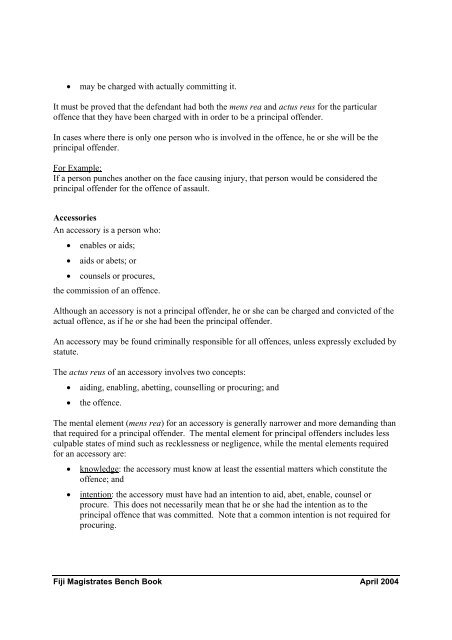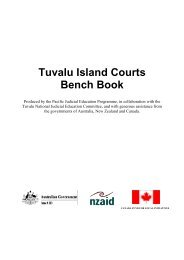Fiji Magistrates Bench Book - Federal Court of Australia
Fiji Magistrates Bench Book - Federal Court of Australia
Fiji Magistrates Bench Book - Federal Court of Australia
Create successful ePaper yourself
Turn your PDF publications into a flip-book with our unique Google optimized e-Paper software.
• may be charged with actually committing it.<br />
It must be proved that the defendant had both the mens rea and actus reus for the particular<br />
<strong>of</strong>fence that they have been charged with in order to be a principal <strong>of</strong>fender.<br />
In cases where there is only one person who is involved in the <strong>of</strong>fence, he or she will be the<br />
principal <strong>of</strong>fender.<br />
For Example:<br />
If a person punches another on the face causing injury, that person would be considered the<br />
principal <strong>of</strong>fender for the <strong>of</strong>fence <strong>of</strong> assault.<br />
Accessories<br />
An accessory is a person who:<br />
• enables or aids;<br />
• aids or abets; or<br />
• counsels or procures,<br />
the commission <strong>of</strong> an <strong>of</strong>fence.<br />
Although an accessory is not a principal <strong>of</strong>fender, he or she can be charged and convicted <strong>of</strong> the<br />
actual <strong>of</strong>fence, as if he or she had been the principal <strong>of</strong>fender.<br />
An accessory may be found criminally responsible for all <strong>of</strong>fences, unless expressly excluded by<br />
statute.<br />
The actus reus <strong>of</strong> an accessory involves two concepts:<br />
• aiding, enabling, abetting, counselling or procuring; and<br />
• the <strong>of</strong>fence.<br />
The mental element (mens rea) for an accessory is generally narrower and more demanding than<br />
that required for a principal <strong>of</strong>fender. The mental element for principal <strong>of</strong>fenders includes less<br />
culpable states <strong>of</strong> mind such as recklessness or negligence, while the mental elements required<br />
for an accessory are:<br />
• knowledge: the accessory must know at least the essential matters which constitute the<br />
<strong>of</strong>fence; and<br />
• intention: the accessory must have had an intention to aid, abet, enable, counsel or<br />
procure. This does not necessarily mean that he or she had the intention as to the<br />
principal <strong>of</strong>fence that was committed. Note that a common intention is not required for<br />
procuring.<br />
<strong>Fiji</strong> <strong>Magistrates</strong> <strong>Bench</strong> <strong>Book</strong> April 2004
















